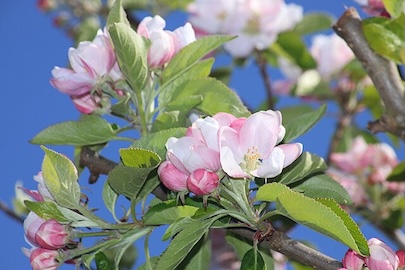Little corellas canoodling, Centennial Park, Sydney. The little corella (Cacatua sanguinea) is a white cockatoo native to Australia and southern New Guinea. These splendid but noisy birds evidently caught the eye of our convict-correspondent in and around Sydney, who likened them to crows back home in England for sheer numbers.
“You can buy for yourself a tin hook pot to hang on before the fire in the Gally to boil tea at times when it is required.* And a few Oranges and lemons for the Sea Sickness* or any thing you please.
“Dear Wife this is a fine Country and a beautiful climate it is like a perpetual Sumer, and I think it will prove congenial for your health, No wild beast nor anything of the Sort out here,* fine beautiful birds and every thing seems to smile with pleasure Cockatoos as plentiful and common as crows in England Provisions of Every kind is very cheap you can buy Beef at 1d penny* per lb flour 1½d per lb tea 2s per lb and Sugar at 2d per lb and other things as cheep, but this is every poor mans diet. Wages is not so very high out here not so much as they are in England.* I have Nothing more to Say at Present more than this is just the country where we can end our days in peace and contentment when we meet.”
Original spelling
* This piece of advice came from the heart. On convict transports such pots were worth their weight in gold, as William Moy Thomas later explained to readers of Household Words through a sobering tale: see Criminal Justice.
* That is to say scurvy, not motion sickness.
* Apart from a few eastern brown snakes, tiger snakes, funnel-web spiders, redback spiders and scorpions, that is. But perhaps these do not count as ‘wild beasts’ in the way that tigers and lions do.
* The word ‘penny’ is superfluous as the abbreviation d means ‘penny’ (literally, denarius). The letter s in this sentence is short for ‘shilling’ and lb stands for ‘pound’. The figures 1½d are spoken as ‘a penny ha’penny’, and 2d as ‘tuppence’.
* The writer manages to use ‘wages’ as a singular noun and also as a plural noun in the same sentence; the plural form is more common nowadays.
Questions for Critics
1. What is the author aiming to achieve in writing this?
2. Note any words, devices or turns of phrase that strike you. How do they help the author communicate her ideas more effectively?
3. What impression does this passage make on you? How might you put that impression into words?
Based on The English Critic (1939) by NL Clay, drawing on The New Criticism: A Lecture Delivered at Columbia University, March 9, 1910, by J. E. Spingarn, Professor of Comparative Literature in Columbia University, USA.
Précis
The letter-writer went on to extol Australia’s sunny climate, and guessed that it would be good for his wife’s health. He admitted that wages were not as high as in England, but added that the money went further, and that he looked forward to spending the rest of his days with his family in this new land. (57 / 60 words)
The letter-writer went on to extol Australia’s sunny climate, and guessed that it would be good for his wife’s health. He admitted that wages were not as high as in England, but added that the money went further, and that he looked forward to spending the rest of his days with his family in this new land.
Variations: 1.increase the length of this precis to exactly 60 words. 2.reduce the length of this precis to exactly 50 words. 3.introduce one of the following words into the precis: besides, just, otherwise, ought, unless, whereas, whether, who.
Archive
Word Games
Spinners Find in Think and Speak
For each group of words, compose a sentence that uses all three. You can use any form of the word: for example, cat → cats, go → went, or quick → quickly, though neigh → neighbour is stretching it a bit.
This exercise uses words found in the accompanying passage.
1 Here. Orange. Sister.
2 Can. Say. Sugar.
3 Cockatoo. Few. Soon.
Variations: 1. include direct and indirect speech 2. include one or more of these words: although, because, despite, either/or, if, unless, until, when, whether, which, who 3. use negatives (not, isn’t, neither/nor, never, nobody etc.)
Confusables Find in Think and Speak
In each group below, you will find words that are similar to one another, but not exactly the same. Compose your own sentences to bring out the similarities and differences between them, whether in meaning, grammar or use.
This exercise uses words found in the accompanying passage.
Opposites Find in Think and Speak
Suggest words or phrases that seem opposite in meaning to each of the words below. We have suggested some possible answers; see if you can find any others.
This exercise uses words found in the accompanying passage.
Variations: 1.instead of opposites, suggest words of similar meaning (synonyms). 2.use a word and its opposite in the same sentence. 3.suggest any 5 opposites formed by adding un-.
High Tiles Find in Think and Speak
Make words (three letters or more) from the seven letters showing below, using any letter once only. Each letter carries a score. What is the highest-scoring word you can make?
Your Words ()
Post Box : Ask Nicholas
Grok : Ask Grok
You are welcome to share your creativity with me, or ask for help with any of the exercises on Clay Lane. Write to me at this address:
See more at Post Box.
If you like what I’m doing here on Clay Lane, from time to time you could buy me a coffee.
Buy Me a Coffee is a crowdfunding website, used by over a million people. It is designed to help content creators like me make a living from their work. ‘Buy Me a Coffee’ prides itself on its security, and there is no need to register.
Related Posts
Picture: By Johannes Moreelse (?1602-1634), Wikimedia Commons. Public domain.. Source.
Posted February 24
John Buchan was moved by the way the nations of the British Empire volunteered for service in the Great War.
Picture: By Ernest Brooks (1878–1957), via Wikimedia Commons. Licence: Public domain.. Source.
Posted March 2 2018
Picture: © Fir0002/Flagstaffotos, via Wikimedia Commons. Licence: GFDL v1.2.. Source.
Posted June 16 2017






